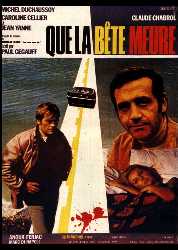
QUE LA BETE MEURE (KILLER! or THIS MAN MUST DIE.)
France/Italy, 1969, 110 minutes, Colour.
Michael Duchaussoy, Caroline Cellier, Jean Yanne, Anouk Aimee.
Directed by Claude Chabrol.
Que Le Bete Meure is based on a novel by Nicholas Blake (the pen-name of poet laureate Cecil Day Lewis, father of Daniel Day Lewis). It was directed by Claude Chabrol, a master of suspense thrillers whose films during the 1960s were outstanding in presentation of French families and moral crises, generally including violence and/or marital infidelity. This continued during the 1970s. Examples are The Unfaithful Wife, The Butcher. Chabrol, however, witness to continue to make a wide range of films into the 21st century.
While the film shows an ordinary situation, tragic as it is, a father grieving over the death of his son in a hit-run accident, it is a powerful film on obsession as well as vengeance and the moral challenge to the father of how he deals with his grief as well as his antagonism towards the hit-run driver. It is an expert film in the Chabrol vein of exploring the dark side of human nature and of ordinary people.
This Man Must Die shows how emotional crises and violent chance events alter personalities. Since the late 50s, director Claude Chabrol, has been interested in these strange changes. Lately he has used the thriller form for his explorations. Here he examines the change in a man whose son is killed by a hit-run driver and who pursues this killer to execute him. At times this is presented in a cerebral manner and we feel we are watching an illustrated casebook of revenge and conflicts of motives. At other times, some scenes are so alive - a pre-dinner drinks and dinner scene is outstanding - that we feel for the people involved. More psychological than thriller.
1. The significance and tone of this title? An alternative title was "Killer". How much more appropriate? The original French was "That the Beast Must Die". Was this more appropriate? The emphasis on the beast? How bestial was Paul? What is the nature of his beastliness? (The hero then identifying with some of this beastliness in his revenge?)
2. The contribution of the colour, locations, the musical accompaniment and its classical tone? Controlling mood?
3. The opening idyllic nature of the child? Audience lulled into sympathy and interest? The importance of this initial mood? How was this mood suddenly changed by the hit-run accident? Audience indignation and horror? The fact that it was a child? The nature of hit and run? (The beastliness).
4. How credible and convincing was the father's grief? How moving? why was his son important to him?
5. Did this explain the nature of his obsession? why was he so obsessed? Why did it drive him? Was it something inside himself? Or was it solely the response to his son's death? Comment on the film as a working out in detail of an obsession? Revenge as an obsession? How credible? How much did the audience share this?
6. Comment on Charles’s shrewdness and his seeking out of clues and following them up. The detailed visualizing of this? His plans, the nature of fate and providence chance and luck? (The themes of providence and chance in the revenge obsession?)
7. How well did Charles insinuate himself with Helene? With the family? What right did he have to do this? The effect on him. on them? Audience response to this insinuation. or did they share the obsession?
8. The influence of love? The relationship between Charles and Helene? Was this credible? His working on Helene for her breakdown for information? The violence on her privacy?
9. The presentation of Paul as a character? Was there any audience sympathy? Was he a beast to all? The way he ruled his family, wife, relations, the effect on his son? The amount of hatred towards his beastliness? The obsession strengthening when seeing the quarry?
10. The nature of the obsession working into hunter and hunted? The detail of its working out? The psychological significance?
11. The impact of such sequences as the drinks, the evening meal? How well filmed? Atmosphere? A revelation of inter-relationships?
12. The importance of Philippe in the film? His relationship with his father? Hatred to death? The linking of Philippe with Charles in obsession?
13. The drama of the cliff, the fall, the boat? The device of Charles’s diary and the plan to murder? Why did he save Paul on the cliff? How credible? Audience approval or disapproval of this?
14. The final confrontation and Charles’s shrewdness? What had happened to his revenge?
15. Philippe and his identification of guilt? His confession? Charles assuming guilt? The identification of the two? Who was really guilty in his heart?
16. How credible were the psychological overtones of this thriller? Did it give it credibility and depth?
17. The use of thriller techniques for suspense? How satisfying a thriller? It is considered a classic. Does it deserve this reputation?